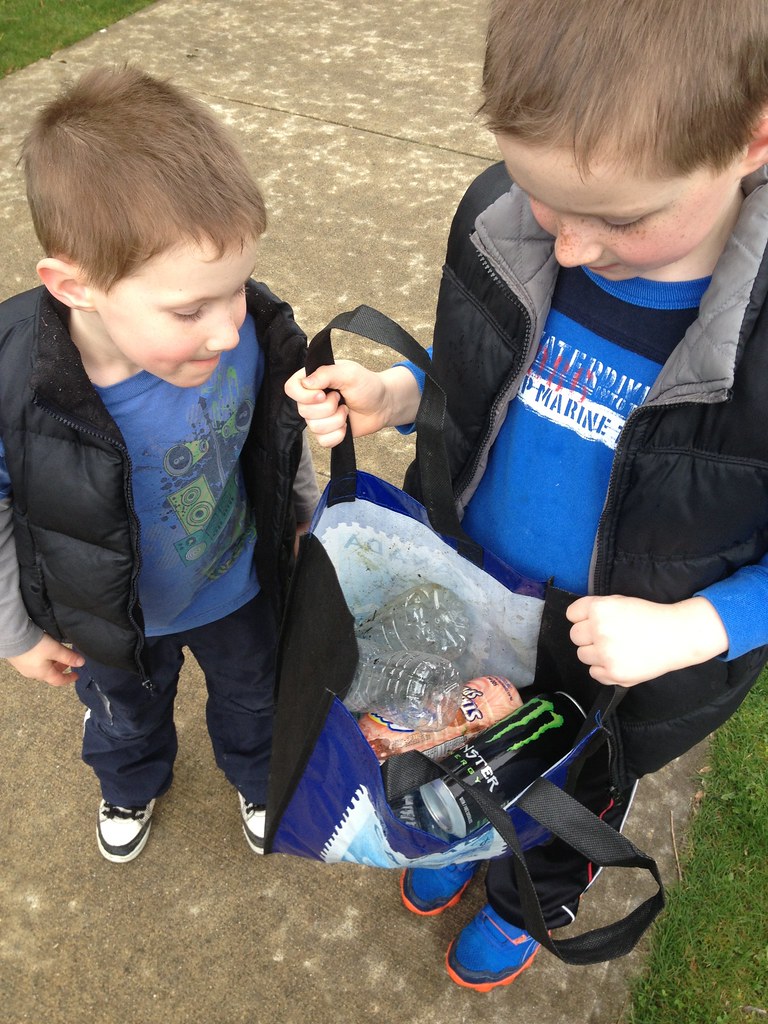I do think about money often and not in the "I need more" kind of way; I want to be wise with what we do have.
“There are two ways to get enough. One is to continue to accumulate more and more. The other is to desire less.” – GK Chesterton
Here Are 11 Ways to Teach Your Kids About Money:
1. Take them grocery shopping.
Have a grocery list on your fridge and bring it each time you go. You can give them items to remember and teach them to stick to the list and look for what is on sale. As they get older you can introduce them about unit prices as well. At Costco the other day my youngest kept repeating "Mom, stick to the list!" when I went to try on a sweater which other shoppers found hilarious but I found helpful. In regards to groceries, teach them that you can buy cookies for $6 or make them for $3. You could go out for dinner but the cost is likely going to be 2-5X more than it would be to make it.
2. Get them to make their own money.
Once they realize how much work it is to make money they may be less likely to waste it. Chores are expected in our home but extra money can be earned by collecting bottles. The kids have done a wonderful job at collecting with their neighbourhood friends in order to first fund their Menchies obsession and more recently their trips to 7-Eleven. You could also give them bigger jobs beyond their regular expected to earn money. For example, we have given our eldest money for washing the cars and cutting the grass.
3. If they want an item, put it on "The List".
So often the kids will come home from school stating the newest thing that they HAVE TO HAVE. I ask them to put it on The List. Whether their birthday is coming up or Christmas, whichever is first, they can physically write it down. Then they will feel heard and cross items off if they really aren't a priority anymore. Sometimes the "must have" item changes several times over the month so the longer that they need to wait for it, the more likely they will finalize what they really want – it will stand the test of time!
4. Give.
In our city one in five people live in poverty. Our kids are fortunate to have all that they need provided to them but for perspective it's important that they know that this is not the same for everyone. They have the responsibility to help others out. Whether it's donating to the food bank, at church or supporting a sponsor child overseas, there are numerous ways to help others out. Let them know where you give and have them help. This summer our oldest sold popsicles at the local playground and 50% of the proceeds went to the food bank.
5. Talk to your kids about the bills you pay when using products in your home.
This doesn't need to be a constant reminder but many kids are unaware of how much services like electricity, gas, Internet, phone and TV cost – get them in the habit of turning off lights and electronics when they leave the room. I cut my kids' and husband's hair which is a great money saver that they are aware of.
6. Have them use their own money to buy extras.
One of my kids has more than enough Beanie Boos. If he wants more, he can buy it himself. Another wanted to buy a special gift for his sibling for her birthday and therefore used his own money. I'm not going to buy them candy so if they want it that is their decision.
7. Save.
Get that bank account and have them go to the bank with you to help understand how it works. If there is a something special that they want they can save for it. Let them know what items YOU are saving for and how long it will take.
8. Show them that you can donate items, sell online and buy secondhand.
It is amazing how many resources are out there to embrace a thrifty lifestyle! We can help out local organizations by donating and buying from them. Teach them that you can purchase a brand new Canucks jersey for $50 or find one secondhand for $5. We love the variety of the thrift stores and swap sites in our area. I would say that 90% of our kids' clothing is secondhand – such a money saver!
9. Be honest about how much you make and how much it costs to live each month.
Kids find it fascinating to learn about salaries as the amount seems astronomical in their eyes. It's a great lesson for them to understand that various jobs offer different amounts of money dependent on the work, education, skills and risk involved. We really try to emphasize that you want to find a career that you love and make the salary work for your family. Help them see that although the amount looks amazing, there are many costs involved each month such as a mortgage, car insurance, medical and dental coverage, electricity, groceries, taxes etc.
10. Save for a big trip together.
We have done a lot of bottle collecting over the years to help fund things like our Disneyland trip! We really only made enough for one day's pass, but still, it took us a full year to get that amount. We also bought tickets when they were on sale and brought our own food into the park which was another great teaching opportunity.
11. Teach them about interest and credit cards.
This is something that I wish I had a greater understanding of when I was younger but one thing my parents taught me was to pay off my credit card bill in full each month. Fortunately my kids have a great love for math so the idea of interest rates is intriguing to them. Be sure to also cover the topic of lottery tickets as it may seem so enticing (especially to my 8-year-old) – what is the actual percent chance that you could win? Is it better to just be happy and wise with the hard-earned money you already have than throwing it away? Probably.
What other tips would you add?
Happy savings from the Fun Police.
As always, I'd love to see you on Facebook, Instagram and Twitter.
Love,
Louise
.jpg)





Such a great post. We went to Disneyland as kids but we fundraised for it as well, we delivered thousands and thousands of fliers over a span of a few years and we used the bottle return money etc etc and did we ever appreciate our trip! I think about this now, when it'd be easier to just pick up a few handful of overtime shifts in the span of a year or two to pay for a trip, rather than to lug all those kids around delivering fliers and listen to them complaining however there's something to say about working hard for what you get to do. I also heard my mom say countless times "put on a sweater" rather than to turn up the heat. Then there was delivering papers from a very young age and holding that paper route in our family for I think 12 or 15 years. Only buying clothes that we needed, not what we wanted (except for gifts) and lots of hand-me-downs. I can imagine it'd hard to instil all these values in kids nowadays when it's even more of an instant gratification time as well as their safety outdoors being more in the forefront of our thinking (ie delivering papers in the dark!)!
ReplyDelete